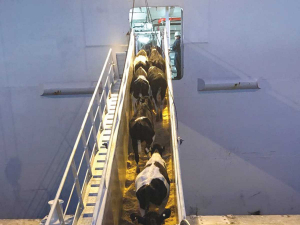Farmers back ‘gold standard’ regulations for livestock exports
Federated Farmers want to see the return of cattle exports but insists that animal welfare and New Zealand’s international reputation must be protected first.
 The Government's live export ban could have very real effects for farmers, say live export businesses.
The Government's live export ban could have very real effects for farmers, say live export businesses.
Government moves to end New Zealand's live export trade will shut down a $500 million-a-year business - as well as diminish farmers' selling options and profitability.
That's the belief of people involved in the country's lucrative livestock live export trade. They also warn of a potential backlash from NZ's most important trading partner, China - where the bulk of our live export trade goes to.
David Hayman, managing director of Waikato-based live export company Genetic Development NZ, describes the Government's decision as one that is aiming for short-term political kudos.
"It is both morally and practically an unjustified decision," he says.
Hayman dismisses the figures used to depict the industry's annual earnings as out-of-date and off a low base. He says the $54 million used was based on the 2018-19 figures, when the live export sector was at a low.
"Around 110,000 cattle were exported last year and the value of that trade was well in excess of $300 million," he adds. "Orders for this year look like 150,000 head at a value nearing $500 million."
Hayman also warns that the move may also have major consequences for NZ's $10 billion annual trade relationship with China.
"We have had a fair indication that there will be a response from China."
South Island-based livestock broker Peter Walsh told Rural News there was very little that could be done about the move as "the Government makes the rules". Walsh's South Canterbury-based company, Peter Walsh and Associates, is the South Island's largest independent, livestock broking company and has seen huge growth in the live export business in the past few years.
He says that ban will have a big impact on NZ's farmers and the country's livestock sector.
"It will be a tremendous blow to farmers in New Zealand as an alternative option for selling livestock," Walsh adds. "Less selling options ultimately means less profit."
Meanwhile, Hayman concedes the industry has suffered from constant misinformation fed to the public by "alarmists" from groups like SAFE and Greenpeace. "As an industry we need to do better job of explaining the way the trade is done and the high standards we adhere to," he adds.
Hayman says claims made by critics of the trade - that animals suffered and there were high death rates - are not supported by the facts. "WE do a world-class job and deliver 99.9% of the animals in good condition, with a loss rate similar to those on NZ farms."
Walsh agrees and sasy the ships animals travel on from NZ are very professional, well manned with high veterinary support.
Horticulture New Zealand (HortNZ) has added its perspective to numerous primary sector voices urging the Government to strengthen its draft legislation to replace the Resource Management Act (RMA).
The Commerce Commission has finalised new information disclosure requirements for local councils and water organisations that deliver water supply and wastewater services.
Beef + Lamb NZ (B+LNZ) is calling for significant changes to the Government’s reforms to the Resource Management Act (RMA).
NZPork says the Government needs to strengthen its proposed planning laws to ensure New Zealand's pig farmers can continue to produce pork.
Good news for kiwifruit growers - a record crop with forecast per hectare returns at record levels for all fruit categories for the 2025-26 season.
As guests gathered on what is known as the Speaker's Lawn - a beautifully manicured patch of grass behind the main buildings of Parliament - to mingle and enjoy a lamb chop to celebrate National Lamb Day, the mood was very much upbeat.

OPINION: The proverbial has really hit the fan in Wellington and exposed a glaring example of a double standard in…
OPINION: Dark suited spin doctors exist to, well, spin, and the nice cuddly progressive types at Greenpeace Aotearoa practice this…